Book4 Unit 2 第一课时l备课
新视野英语教程教案book4Unit2
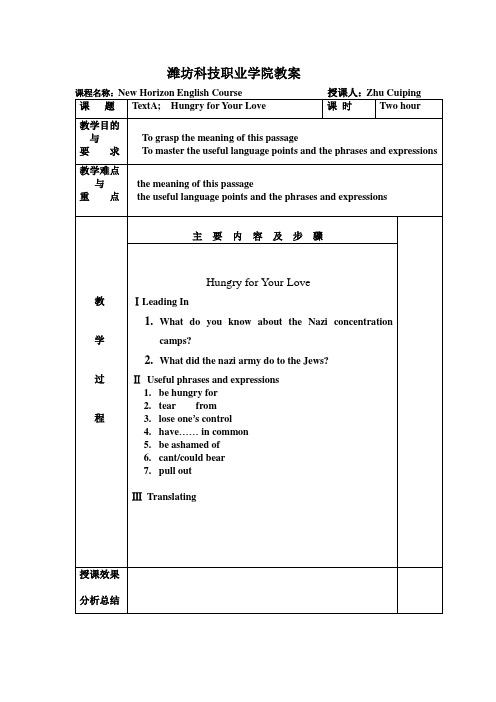
潍坊科技职业学院教案Text A Hungry for Your LoveI Detailed Study of the TextA1. I am almost dead, surviving from day to day, from hour to hour, ever since I was taken from my home and brought here with tens of thousands of other Jews.from day to day: day by day; as time goes on 一天天地;日益地The symptoms changed from day to day.症状一天天在发生变化。
The problem is getting worse from day to day.这个问题变得一天比一天糟。
from hour to hour: (of something) changing very quickly and very often (变化)快速不断地;每小时都有地The weather conditions in these mountains change from hour to hour.山间的天气情况时时在变。
2. I want to look away, oddly ashamed for this stranger to see me like this but I cannot tear my eyes from hers.Meaning:The girl, who is a stranger, looks at me like this, which shames me in a strange way. But I cannot move my eyes away from hers; I just cannot stop looking at her.oddly:adv. in a strange or peculiar manner 奇怪地;古怪地Mary looked at Tom very oddly.玛丽怪模怪样地看着汤姆。
新标准大学英语BOOK4-unit2教案-李骠
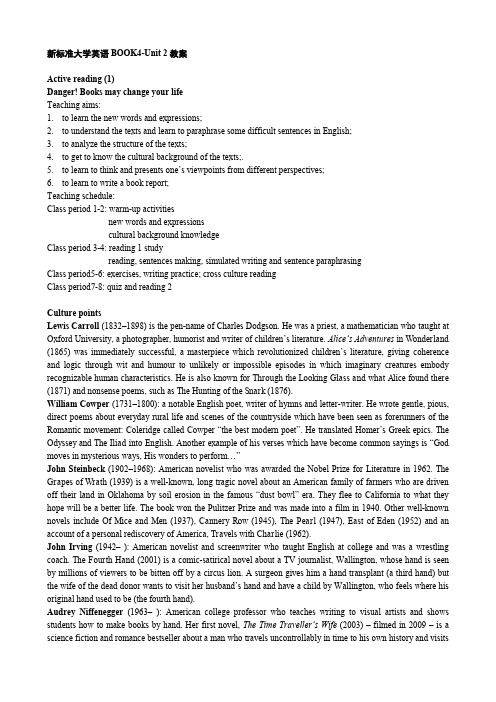
新标准大学英语BOOK4-Unit 2教案Active reading (1)Danger! Books may change your lifeTeaching aims:1.to learn the new words and expressions;2.to understand the texts and learn to paraphrase some difficult sentences in English;3.to analyze the structure of the texts;4.to get to know the cultural background of the texts;.5.to learn to think and presents one’s viewpoints from different perspectives;6.to learn to write a book report;Teaching schedule:Class period 1-2: warm-up activitiesnew words and expressionscultural background knowledgeClass period 3-4: reading 1 studyreading, sentences making, simulated writing and sentence paraphrasingClass period5-6: exercises, writing practice; cross culture readingClass period7-8: quiz and reading 2Culture pointsLewis Carroll (1832–1898) is the pen-name of Charles Dodgson. He was a priest, a mathematician who taught at Oxford University, a photographer, humorist and writer of children’s literature. Alice’s Adventures in Wonderland (1865) was immediately successful, a masterpiece which revolutionized children’s literature,giving coherence and logic through wit and humour to unlikely or impossible episodes in which imaginary creatures embody recognizable human characteristics. He is also known for Through the Looking Glass and what Alice found there (1871) and nonsense poems, such as The Hunting of the Snark (1876).William Cowper (1731–1800): a notable English poet, writer of hymns and letter-writer. He wrote gentle, pious, direct poems about everyday rural life and scenes of the countryside which have been seen as forerunners of the Romantic movement: Coleridge called Cowper “the best modern poet”. He translated Homer’s Greek epics. The Odyssey and The Iliad into English. Another example of his verses which have become common sayings is “God moves in mysterious ways, His wonders to perform…”John Steinbeck (1902–1968): American novelist who was awarded the Nobel Prize for Literature in 1962. The Grapes of Wrath (1939) is a well-known, long tragic novel about an American family of farmers who are driven off their land in Oklahoma by soil erosion in the famous “dust bowl” era. They flee to California to what they hope will be a better life. The book won the Pulitzer Prize and was made into a film in 1940. Other well-known novels include Of Mice and Men (1937), Cannery Row (1945), The Pearl (1947), East of Eden(1952) and an account of a personal rediscovery of America, Travels with Charlie (1962).John Irving (1942–): American novelist and screenwriter who taught English at college and was a wrestling coach. The Fourth Hand (2001) is a comic-satirical novel about a TV journalist, Wallington, whose hand is seen by millions of viewers to be bitten off by a circus lion. A surgeon gives him a hand transplant (a third hand) but the wife of the dead donor wants to visit her husband’s hand and have a child by Wallington, who feels where his original hand used to be (the fourth hand).Audrey Niffenegger (1963–): American college professor who teaches writing to visual artists and shows students how to make books by hand. Her first novel, The Time Traveller’s Wife (2003) – filmed in 2009 – is a science fiction and romance bestseller about a man who travels uncontrollably in time to his own history and visitshis wife in her childhood, youth and old age. His wife needs to cope with his absences and dangerous life while he travels. The story is a metaphor for distance and miscommunication in failed relationships.Paul Torday (1946– ): a British busines sman who worked for a company that repaired ship’s engines for many years. Salmon Fishing in the Yemen (2007) was his first novel. It is a political satire and comedy about a dull civil servant who becomes involved in a plan to populate the desert with Scottish salmon. Politicians manage the media to “spin” this as a plan they support in order to divert attention from problems in the Middle East. There are themes of cynicism and belief, and East-West culture clashes.Aleksandr Solzhenitsyn (1918–2008): a Russian writer who was imprisoned in Soviet labour camps in 1945; after eight years, he was exiled to Kazakhstan and not freed until 1956, when he became a teacher. In 1970 he was awarded the Nobel Prize for Literature but not receive it until 1974. He went to Germany, Switzerland and the USA, returning to Russia in 1994. His best known novels were based on his experiences as a prisoner and include: One Day in the Life of Ivan Denisovich (1962), Cancer Ward (1968), The Gulag Archipelago (1974–1978). His later works were about Russian history and identity.Graham Greene (1904–1991): a British novelist, short-story writer, playwright, travel writer and essayist. He wrote a number of thrillers (he called them ‘entertainments’) which dramatize an ambiguous moral dilemma, often revealing guilt, treachery, failure and a theme of pursuit. Greene was also a film critic and all of these novels have been made into films: Brighton Rock (1938), The Power and the Glory (1940), The Heart of the Matter (1948), The Third Man (1950), The Quiet American (1955), and Our Man in Havana (1958).E. M. Forster (1879–1970): a British novelist and writer of short stories and essays. He lived at different periods in Italy, Egypt and India and taught at Cambridge University. His best known novels include A Room with a View (1908), Howard’s End (1910), A Passage to India (1924) which have all been made into films. His writing about reading and writing includes a book of lectures, Aspects of the Novel (1927).Thomas Merton (1915–1968): an American Catholic writer, who was a Trappist monk in Kentucky. He wrote over 70 books, including many essays about Buddhism and a translation into English of the Chinese classic, Chuang Tse. He had a great deal to say about the meeting of Eastern and Western cultures and wrote many letters to writers, poets, scholars and thinkers. He read a lot in English, Latin, French and Spanish and said he always had at least three books which he was reading at any one time.William Blake (1757–1827): a British poet, artist and mystic, who read widely in English, French, Italian, Latin, Greek and Hebrew. He made many engravings to illustrate the work of such writers as Virgil, Dante and Chaucer, as well as his own poems. He stressed that imagination was more important than rationalism and the materialism of the 18th century and criticized the effects of the industrial revolution in England, but his work was largely disregarded by his peers. He is best known for his poetry in Songs of Innocence (1787) and Songs of Experience (1794). His belief in the oneness of all created things is shown in his much-quoted verse, “To see the world in a grain of sand / And a heaven in a flower, / Hold infinity in the palm of your hand / And eternity in an hour.”Clifton Fadiman (1904–1999): an American writer, radio and TV broadcaster and editor of anthologies. For over 50 years he was an editor and judge for the Book-of-the-Month Club. In 1960 he wrote a popular guide to great books for American readers, The Lifetime Reading Plan, which discusses 133 authors and their major work: the 1997 edition includes 9 authors from China.J. K. Rowling (1965–): British writer of the seven Harry Potter fantasy books. She studied French and Classics at Exeter University, before teaching English in Portugal and training to teach French in Scotland. The main idea about a school for wizards and the orphan Harry Potter came on a delayed train journey from Manchester to London in 1990. She began to write as soon as she reached London. Twelve publishersrejected the first book before Bloomsbury, a small London publisher, agreed to publish it. Later books have repeatedly broken all the sales records (as have some of the films). She is one of the richest women in the UK and a notable supporter of many charities.Language points1 Variety’s the very spice of life, / That gives it all its flavour … (Para 2)Spices are made from plants and added to food to give it its particular flavour or taste. The English proverb “Variety is the spice of life” (the proverb comes from Cowper’s poem) therefore means that variety gives life extra value and allows you to appreciate life in particular ways.2 We learn to look beyond our immediate surroundings to the horizon and a landscape far away from home. (Para 3)This means that through reading we learn to look beyond our immediate experience or familiar environment to things beyond our immediate experience, ie to completely different things that we can imagine and experience through books.3 When a baseball player hits a home run he hits the ball so hard and so far he’s able to run round thefour bases of the diamond, and score points not only for himself but for the other runners alreadyon a base. (Para 9)In the American game of baseball, the field of grass is diamond-shaped and has four bases (specific points marked around the diamond), round which players must run to score points. One team bats (ie team members take turns to hit the ball and run round the bases) and the members of the other team throw (pitch) the ball and, when it is has been hit, try to catch it or get it quickly to one of the four bases. If a batting player can hit the ball hard enough, he can run round all four bases before the other team can get the ball and thus score maximum points – with a home run. In the passage, a really good book is a home run.3 Choose the best answer to the questions.1 Why are we like Alice in wonderland when we read a book?(a) Because, like Alice, we often have accidents.(b) Because reading makes us feel young again.(c) Because reading opens the door to new experiences.(d) Because books lead us into a dream world.2 According to the writer, what is the advantage of reading over real life?(a) There is more variety in books than in real life.(b) We can experience variety and difference without going out of the house.(c) The people we meet in a book are more interesting than real people.(d) It’s harder to make sense of real life than a book.3 What do the seven novels listed in Paragraph4 have in common?(a) Their titles stimulate imagination.(b) They represent the best writing by British and American novelists.(c) They have become classics.(d) You can find all of them in any local library.4 At what moment in our lives do books become important?(a) As soon as we start reading.(b) When we start buying books to fill our shelves at home.(c) When we start listening to bedtime stories.(d) Only when we are ready for books.5 What claim did Merton make about the poems of William Blake?(a) They were similar to the works of the Greek writers and thinkers.(b) They helped him understand the meaning of life.(c) They created a sense of confusion.(d) They taught him a lot about modern culture.6 What is meant by a home-run book?(a) A book which is so good you are unable to put it down.(b) A book that the whole family can enjoy.(c) A children’s book that is read and appreciated by adults.(d) A book that hits hard like a home run in the game of baseball.Dealing with unfamiliar words4 Match the words in the box with their definitions.1 to make someone feel that they do not belong to your group (exclude)2 to fail to do something that you should do (neglect)3 to mention something as an example (cite)4 to be strong enough not to be harmed or destroyed by something (withstand)5 in most situations or cases (normally)6 to be about to happen in the future (await)5 Complete the paragraph with the correct form of the words in Activity 4.When I lived in Britain, one of my favourite radio programmes was ca lled “Desert Island Discs”. The format was always the same: Guest celebrities were asked to imagine they had been washed ashore on a desert island, and had to choose nine books – (1) excluding the Bible and Shakespeare, which they were already provided with – to take with them to the island, to help them (2) withstand the physical and mental isolation. I sometimes like to think which books I would take. (3) Normally, like most people, I don’t have much time for reading, and I could (4) cite dozens of books which I have never read but which I w ould like to. It’s an opportunity I have (5) awaited all my life, in fact. But what would I choose? Mostly novels, probably, but I wouldn’t (6) neglect to include a volume or two of poetry. My first choice, I think, would be Tolstoy’s War and Peace. I’ve never read it, but I’m ready to believe that it is one of the most marvelous books ever written.6 Replace the underlined words with the correct form of the words in the box.1 In a good novel, the writer and reader communicate with each other. (interact)2 I have to face up to the problem sooner or later. (confront)3 I read the book in one sitting and Mary did too. (likewise)4 E. M. Forster was one of the most important and respected British novelists of the 20th century. (influential)5 Do you believe that a work of literature can actually lead to social changes? (induce)6 Robert Burns was a great poet who wrote in the language variety spoken in Scotland. (dialect)7 The Time Traveller’s Wife is the story of a man who has a strange and inexplicable genetic disorder. (mysterious)7 Answer the questions about the words.1 If you have had a disconcerting experience, do you feel a bit (a) tired, or (b) confused?2 If you have a vista of something, can you (a) see or imagine it, or (b) go and visit it?3 Would you express great wrath by (a) smiling at someone, or (b) shouting at them?4 If you feel enchanted by a book, do you (a) like it a lot, or (b) not like it at all?5 Is a writer who is supremely talented (a) very good, or (b) quite good at his job?6 If reading fosters an understanding of certain problems, does it (a) help understanding, or (b) prevent it?7 If you are desperately trying to get a job, are you (a) trying very hard to get it, or (b) caring littlewhether you get it or not?8 Is a sensation (a) a certainty, or (b) just a feeling?Reading and interpreting8 Check () the writer’s main purpose in writing the passage.1 To show the reader how to read fiction.2 To suggest that fiction is more powerful than non-fiction.√ 3 To persuade the reader that reading can be a life-changing experience.4 To claim that books provide the meaning to life.5 To recommend some major novels to read.9 Work in pairs. Look at the statements from the passage and discuss the questions.1 … when we pick up a book we are about to enter a new world.Do you agree with this statement? Is this true of every book?I agree with this up to a point, but it is not true of every book because with some books you may already be very familiar with the world of those particular books so although you might read them, they wouldn’t take you to a new world.2 We’ll have experiences which are new, sometimes disconcerting, ma ybe deeply attractive, possibly unpleasant or painful, but never less than liberating from the real world we come from. How can reading be a “painful” experience? In what sense does reading “liberate” us from the real world?It is easy to imagine how reading could be a painful experience for some people: It depends on the book and on the reader’s background and personal ity. For instance, I can see that a story about bullying, might be painful to read if you were bullied when you were a child – it would remind you of the experience of being hurt.Reading can liberate us because in books we can have all sorts of wonderful and interesting experiences which would be impossible for us in the real world: we can travel to distant places or go anywhere in time, we can meet all sorts of people we probably wouldn’t meet anywhere else except in books.3 Reading books allows us to enjoy and celebrate this variety and difference in safety, and provides us with an opportunity to grow.How does this idea contrast with the title of the passage? In what way can a book help us “grow”? The word “Danger” in the title contrasts with this idea that reading is a safe experience. However, this is not a contradiction because experiences that would be dangerous in real life are quite safe when we read about them in books. The author seems to think that we grow in our minds with a better understanding and enriched imagination when we meet a wide variety of people and different situations in books. This vicarious experience in reading is a safe way to grow mentally and emotionally.4 To interact with other people’s lives in the peace and quiet of our homes is a privilege which only reading fiction can afford us.Do you agree? Is fiction really different from other types of writing?Well, I think this is true because in fiction we do interact with the characters, both positively (with characters we can identify with) and negatively (with characters we do not like or admire). But this doesn’t mean that we don’t interact with the writer in non-fiction. Surely all of us have the experience of feeling that we do interact with writers in newspaper or magazine articles and in some kinds of non-fiction which may be about science, for example. I suppose it depends on the style of the writing and on the personality of the writer (and of characters in fiction) and on us, as readers.5 We even understand … that we h ave more in common with other readers of books in other cultures than we might do with the first person we meet when we step out of our front doors.This suggests that people who read are different from people who don’t read. Do you agree? Well, I am not sure. I guess that people who read similar books, fiction or non-fiction, would share some common knowledge, experience and maybe feelings and they would probably talk about these when they know about each other’s reading habits. Of course, they wouldn’t ne cessarily have other things in common, just this particular connection with a certain kind of culture through reading. Maybe people in the street do not have to share this reading experience, so in that respect they are different, but they may be quite similar and share many cultural experiences in other ways –after all they live in the same place, probably speak the same language. So, I think it’s all a question of what sort of common experiences you are talking about. The more I think about it, the less I agree!6 From the bedtime story read by a parent to their child all the way through to the sitting room lined with booksin our adult homes, books define our lives.What do you understand by “books define our lives”?I suppose they would be those books – not many, surely? – which have made a great impact and remain so strong in our memories that do have a function of defining something in our lives. However, I think the author has exaggerated here. Books are not the only things that define our lives. People, places and special events define our lives too, so books are only one part which for some people have a great influence but for others maybe very little or none at all. We have to remember that some people simply don’t read books. Even some students on ly read what they have to read, nothing more than that!7 We cannot withstand the hunger to visit another world, to meet different people, to live other lives and to reflect on ourselves.Do you agree that we “live other lives” when reading? Or is this an exaggeration?I agree that we have strong imaginative experiences when we read. Maybe you can call this “living other lives” sometimes, but for me, anyway, this simply doesn’t happen very often and when it does happen it is only for a short time. I think the writer is exaggerating here to make the point that reading has importance in our imagination.8 Books may change your life.Is this a suitable title – and ending – for the passage? Why / Why not?Yes, I think it OK as a catchy title – it gets our attention, after all, and repeating it at the end makes a kind of coda like the ending of a piece of music which echoes something near the beginning. Also if you look carefully, it does have a note of caution by using “maybe” instead of “will”, so this title isn’t a definite promise, it’s more of an attractive idea, that your life may be changed through books, but might not be.Now discuss which of the above statements would have been more effective if backed up byexample(s).In fact, it seems that any of them could effectively be illustrated by examples, but if all of them were to be backed up with examples, the whole passage would be a lot longer and maybe too heavy with examples.If I had to choose just two statements which need supporting examples, I would say numbers three and six because I’d say the ideas about ‘growing’ through books and books ‘defining’ our lives are too vague without examples.Active reading (2)They were alive and they spoke to meBackground informationThis is from The Books in My Life by Henry Miller (1861–1980), an American novelist, writer and painter. Miller was born in New York, lived in Paris 1930–1939, and then in California. His best-known works blend fiction, autobiography, social criticism and mysticism: Tropic of Cancer (1934 published in France) describes his life and loves in Paris and because of its sexual frankness it was not published in the USA till 1961; Black Spring (1936) has ten autobiographical stories; Tropic of Capricorn (1939) is about his years with the Western Union Telegraph Company; The Colossus of Maroussi (1941), considered by some critics to be his best work, is a travel book about people from his stay in Greece.In The Books in My Life (1969) Miller looks at 100 books that influenced him. His list includes children’s books written originally for adults (eg Alice in Wonderland, The Arabian Nights, Greek Myths and Legends, Robinson Crusoe, The Three Musketeers); many French novels and poetry (eg by Balzac, Hugo, Giono, Nerval, Proust, Rimbaud, Huysmans, Maeterlinck), German novels (by Mann, Hesse, Dreiser) and the Chinese Lao Tse and Fenollosa’s The Chinese Written Character as a Medium for Poetry, besides work by American writers (Twain, Emerson, Thoreau, Whitman), Dostoievshy, Nietzsche, Joyce and writers on spiritual topics.Culture pointsAugust Strindberg (1849–1912): A Swedish playwright and a prolific writer of novels, short stories, satires, essays and poems, and a photographer, who tried various jobs before becoming assistant librarian at the Royal Library in Stockholm and established an experimental theatre. He is best known for his plays, including The Father (1887) and Miss Julie (1888), and for his vitality, vigour, and brilliant use of language. Miller cites Strindberg’s autobiographies, The Confession of a Fool (vol.2), a passionate love story and account of problems in his marriage, and The Inferno (vol.3), a study of his religious conversion, delusions and neuroses which reflect Strindberg’s periods of mental instability.Blaise Cendrars (1887–1961) is the pen name of Frédéric Sauser, a Swiss-born French novelist, shortstory writer, poet, and film-maker, who led a life of constant travel (he was born in an Italian railway train) doing various jobs in Russia, Europe, North and South America and Asia – he is said to have shoveled coal on steam trains in China. He lost his right arm fighting for France in World War I. His prose includes vivid, witty, action-packed novels, like Moravagine (1926), which describe travel and adventure, or works directly inspired by his own experience, like The Astonished Man (1945) and The Cut Hand (1946), and four volumes of memoirs. Miller admired his work and lists ‘virtually the complete works’ of Cendrars as influential reading.Rémy de Gourmont (1858–1915): a French writer of 50 books: essays, novels and poetry, with a strong interest in medieval Latin literature; as a critic he was admired by T. S. Eliot. He was a librarian at the National Library in Paris; later, a painful skin disease kept him largely at home. He was influential in the symbolist movement in literature. He claimed that a work of art exists only through the emotion it gives us. He asserted the need to get away from the unquestioning acceptance of commonplace ideas and associations of ideas, and believed it was necessary for thought to proceed by imagery rather than by ideas.Julius Caesar (110 BC–44 BC): a Roman statesman, known as a great military strategist. As a general he was famous for the conquest of Gaul (modern France and Belgium) which he added to the Roman Empire. He also made two expeditions to Britain, was governor of Spain and traveled in North Africa and Egypt. He was a good speaker and he wrote several books of commentaries and memoirs on Roman wars and military campaigns. Caesar’s writin g is often studied today by those who learn Latin.The Julius Caesar of literature: this phrase compares Cendrars with Caesar: both were men of action, travelers, adventurers, explorers, who somehow found time to read a lot and write books.Language points1 The fact, however, that in the past I did most of my work without the aid of library I look upon asan advantage rather than a disadvantage. (Para 1)This is irony. Miller is writing about the importance of reading and about key books in his life, but there is a paradox: Only recently has he been able to get all the books he has wanted all his life (ie he now has money, as a best-selling writer, to buy books) and, as a writer, he wrote books without the help of a library. He says that not having books wa s an advantage. The explanation is probably that Miller’s early writing was a mixture of autobiography and fiction, so he didn’t need to read other books or refer to them to do his own writing. The irony is that he is saying this in a book about the books the influenced him.2 A good book lives through the passionate recommendation of one reader to another. (Para 3)Miller thinks that a good part of the ‘life’ of a book is how one reader recommends it to another with enthusiasm, ie books are about sharing e xperience, not just the author’s experience in the book and the reader’s experience of reading it, but also the experience of word-of-mouth or face-to-face recommendation by other readers.3 And the better the man the more easily will he part with his most cherished possessions. (Para 4)This continues Miller’s thought that books are for sharing. A good person will share things he or she loves. In this case, such a person will give or lend favourite books and such generosity makes friends: When you give books you get friendship.4 If you are honest with yourself you will discover that your stature has increased from the mereeffort of resisting your impulse. (Para 6)Miller’s argument here is that you should not read everything, but that you should choose ve ry carefully and selectively. This means you should resist the temptation to read some things which are not really going to add to your knowledge or enjoyment (not every book will do this, only some). Here, he says that in this way, we grow (we “increase our stature”). That is, we grow by not reading many books. The implication is that if we choose the very best books and read these few really carefully we will get the best from them – and grow by such selection. Miller discusses 100 books which he things are such books.5 All on the side, as it were. (Para 7)Cendrars was a man of action who spent most of his time on travels and adventures. Surprisingly (you would think he did not have time), he read a lot in different languages and even wrote many books – this was in addition to his main activities.6 For, if he is anything, Cendrars, he is a man of action, an adventurer and explorer, a man who has known how to “waste” his time royally. (Para 7)Cendrars had a huge reputation as a man of action, travelling, having adventures and exploring different countries and yet he read a lot (he knew how to use the little time available to read). “Waste” is in quotes to show irony (reading isn’t a waste of time), that he reads in a royal manner (ie very thoroughly). The sentence structure here is quite French with the repetition of “he”.Reading and understanding2 Choose the best answer to the questions.1 What does Miller consider to have been an advantage during his writing career?(a) To have been able to read all the books he wanted.(b) To have grown up in a room full of books.(c) To have written without the aid of a library.(d) The fact that he never wanted to own any books.2 What did three stars on a book mean in the public library in Miller’s youth?(a) Young people weren’t allowed to read them.(b) They were the most popular books in the library.(c) They were intended for children.(d) They were more exciting than one-star books.3 Why does Miller hope the star system still exists in public libraries?(a) It is an efficient system which works well.(b) It discourages people from reading inappropriate books.(c) It makes people interested in reading.(d) It makes it easier for people to recognize books.4 Why do people lend books, in Miller’s opinion?(a) Because they feel the need to share their feelings.(b) It’s the best way to make a friend.(c) It’s less risky than lending money.(d) Because it’s not possible to possess a book for ever.5 According to Miller, what should you do when you find a book you want to read?(a) Pick it up and start reading.(b) Ask a friend for advice about the book.(c) Think about whether you really need to read it.(d) Only read it if it is original.6 What does Miller especially admire about Blaise Cendrars?(a) He had a very adventurous life.(b) He was a great writer.。
【公开课教案】人教版高中英语必修四Unit2 Reading 教案
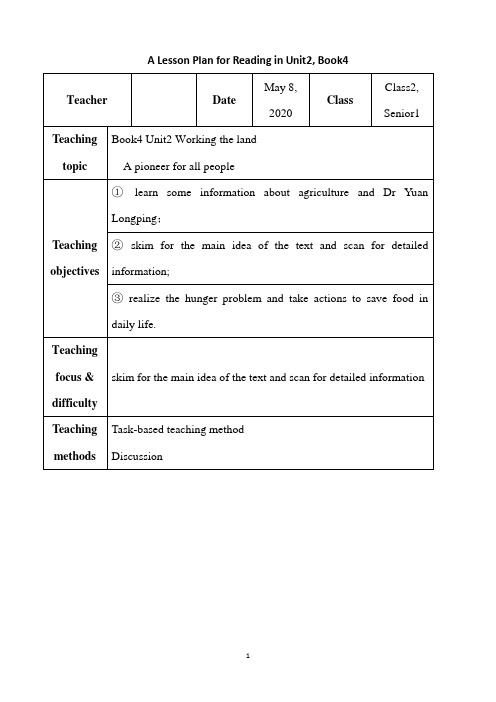
procedure ___
(40mins) Step2 Skimming
Task1: What’s the text mainly about?
A. How to rid the world of hunger.
Байду номын сангаас
B. How super hybrid rice was developed.
C. A brief introduction to Yuan Longping and his super hybrid
d. Nearly 200 million tons of rice was produced by growing his hybrid rice. e. He searched for a way to increase rice outputs without
expanding the area of fields. f. He helps rid the world of hunger by circulating his knowledge in less developed countries. Para. 3 Dr Yuan’s personality and hobbies True(T) or False(F) 1. Dr Yuan would rather work than lead a comfortable life. 2. He loves swimming, running and reading. 3. Money means little to him. 4. He is satisfied with his life because he is now rich and famous.
1
新视野读写Book 4 Unit 2教案
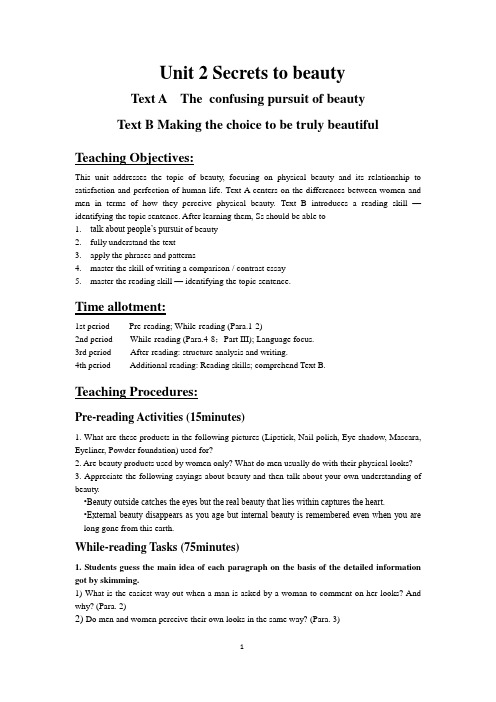
Unit 2 Secrets to beautyText A The confusing pursuit of beautyText B Making the choice to be truly beautifulTeaching Objectives:This unit addresses the topic of beauty, focusing on physical beauty and its relationship to satisfaction and perfection of human life. Text A centers on the differences between women and men in terms of how they perceive physical beauty. Text B introduces a reading skill —identifying the topic sentence. After learning them, Ss should be able to1. talk about people’s pursu it of beauty2. fully understand the text3. apply the phrases and patterns4. master the skill of writing a comparison / contrast essay5. master the reading skill — identifying the topic sentence.Time allotment:1st period------ Pre-reading; While-reading (Para.1-2)2nd period------While-reading (Para.4-8;Part III); Language focus.3rd period------ After-reading: structure analysis and writing.4th period------ Additional reading: Reading skills; comprehend Text B.Teaching Procedures:Pre-reading Activities (15minutes)1. What are these products in the following pictures (Lipstick, Nail polish, Eye shadow, Mascara, Eyeliner, Powder foundation) used for?2. Are beauty products used by women only? What do men usually do with their physical looks?3. Appreciate the following sayings about beauty and then talk about your own understanding of beauty.•Beauty outside catches the eyes but the real beauty that lies within captures the heart. •External beauty disappears as you age but internal beauty is remembered even when you are long gone from this earth.While-reading Tasks (75minutes)1. Students guess the main idea of each paragraph on the basis of the detailed information got by skimming.1) What is the easiest way out when a man is asked by a woman to comment on her looks? And why? (Para. 2)2) Do men and women perceive their own looks in the same way? (Para. 3)3)Why do men and women view their looks so differently? (Para. 6)4)What are the differences between men and women in care for details in women’s appearance? (Paras. 9-10)5)What conclusion does the author draw after contrasting men and women on different points ? (Para. 11)2. Detailed study of the text.●Detailed learning of key vocabulary and useful patterns1) affix value to 认为…有价值如果你真正想要吸引顾客,你就必须十分重视自己店里所卖产品的质量。
2018版高考英语大一轮复习Book4Unit2ChallengingYourselfⅠ教案(含解析)重庆大学版

Unit 2 Challenging Yourself Ⅰ话题词汇1.aboard prep.上(船、飞机、火车、汽车等)2.accommodation n.住宿;膳宿3.destination n.目的地;终点4.enjoy v.欣赏;享受乐趣;喜欢5.guide n.导游;向导6.luggage/baggage n.行李7.aplaceofinterest名胜8.bestruckby...被……迷住9.haveagoodtrip旅行顺利10.takeapicture拍照话题佳作你对下面这则广告很感兴趣,请按广告的宣传内容写一篇经历故事寄给InternationalYouthClub。
佳作欣赏Oneofthemostunforgettableexperiences Ihaveeverhad wastobeababysitterinmyaunt ’shome when16yearsold.Iwasquiteexcited themomentIthoughtofbeingwithmycousin.Shewasthemostlovelybab yIhadeverseen.AfterIsawherfallasleepquietlyonherbed,IbegantowatchTV.Justafewminuteslater,Iwasinterruptedbyloudcrying.I foundhercrying madly withhersmallmouthopenwidelyandh erskinturningpink.I hadnochoicebutto runtoherto comfort herandmakesurethatherneedsw ereimmediatelymet,inwhichcaseshewouldlaughhappily.Ienjoyandwill cherish theexperiencewithmylittlecousin.名师点睛本文语言简练,条理清楚,使用了一些高级词汇,如hadnochoicebutto,comfort,cherish 等;句型的运用也灵活多变,如定语从句Ihaveeverhad和inwhichcaseshewouldlaughhappily,时间状语从句themomentIthoughtofbeingwithmycousin,“find+宾语+宾语补足语”结构和with复合结构的运用。
(新课标)高考英语第1部分Book4Unit2Sportsevents教案(含解析)牛津译林版
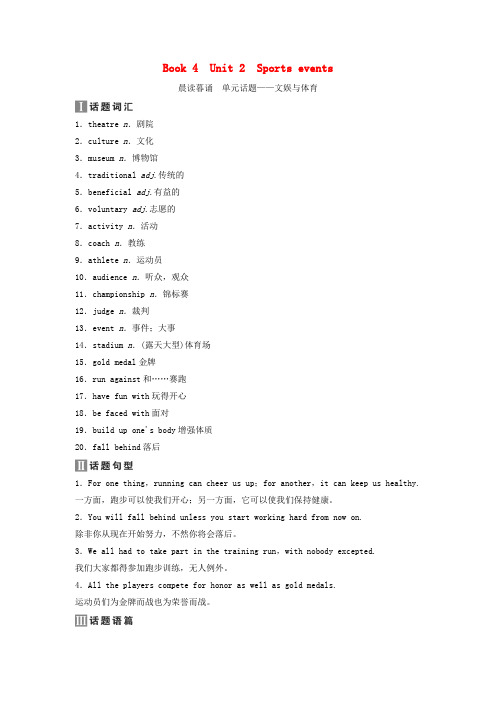
Book 4 Unit 2 Sports events晨读暮诵单元话题——文娱与体育1.theatre n.剧院2.culture n.文化3.museum n.博物馆4.traditional adj.传统的5.beneficial adj.有益的6.voluntary adj.志愿的7.activity n.活动8.coach n.教练9.athlete n.运动员10.audience n.听众,观众11.championship n.锦标赛12.judge n.裁判13.event n.事件;大事14.stadium n.(露天大型)体育场15.gold medal金牌16.run against和……赛跑17.have fun with玩得开心18.be faced with面对19.build up one's body增强体质20.fall behind落后1.For one thing,running can cheer us up;for another,it can keep us healthy. 一方面,跑步可以使我们开心;另一方面,它可以使我们保持健康。
2.You will fall behind unless you start working hard from now on.除非你从现在开始努力,不然你将会落后。
3.We all had to take part in the training run,with nobody excepted.我们大家都得参加跑步训练,无人例外。
4.All the players compete for honor as well as gold medals.运动员们为金牌而战也为荣誉而战。
(2017·高考北京卷)你的英国朋友Jim所在的学校要组织学生来中国旅行,有两条线路可以选择:“长江之行”或者“泰山之旅”。
PEP小学英语四年级上册第二单元第一课时说课稿
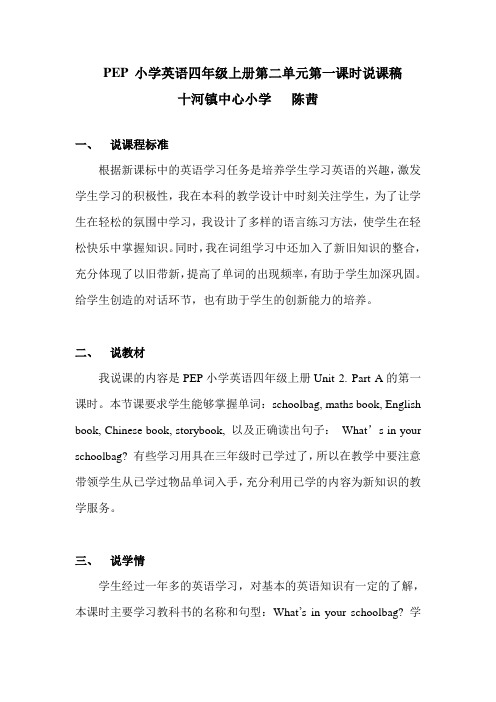
PEP 小学英语四年级上册第二单元第一课时说课稿十河镇中心小学陈茜一、说课程标准根据新课标中的英语学习任务是培养学生学习英语的兴趣,激发学生学习的积极性,我在本科的教学设计中时刻关注学生,为了让学生在轻松的氛围中学习,我设计了多样的语言练习方法,使学生在轻松快乐中掌握知识。
同时,我在词组学习中还加入了新旧知识的整合,充分体现了以旧带新,提高了单词的出现频率,有助于学生加深巩固。
给学生创造的对话环节,也有助于学生的创新能力的培养。
二、说教材我说课的内容是PEP小学英语四年级上册Unit 2. Part A的第一课时。
本节课要求学生能够掌握单词:schoolbag, maths book, English book, Chinese book, storybook, 以及正确读出句子:What’s in your schoolbag? 有些学习用具在三年级时已学过了,所以在教学中要注意带领学生从已学过物品单词入手,充分利用已学的内容为新知识的教学服务。
三、说学情学生经过一年多的英语学习,对基本的英语知识有一定的了解,本课时主要学习教科书的名称和句型:What’s in your schoolbag? 学生们学习了一些文具名称,可以结合到本课内容一同练习,来帮助学生巩固知识。
四、说教学目标本课时是学生学习书包里面有什么的第一课时,掌握教科书的名称和句型:What’s in your schoolbag?尤其重要。
本节课的教学目标主要有一下几种:一、知识目标:1. 听说读写单词和词组schoolbag, maths book, English book, Chinese book, storybook. 2. 听说读句型:What’s in your schoolbag?二、能力目标:1. 能运用相关的词组对句型进行替换练习。
2. 能准确地用Let’s talk中句型描述自己的书包。
三、情感目标:要求学生爱护课本,养成整理自己物品的好习惯。
Book 4 Unit 2 阅读 教案
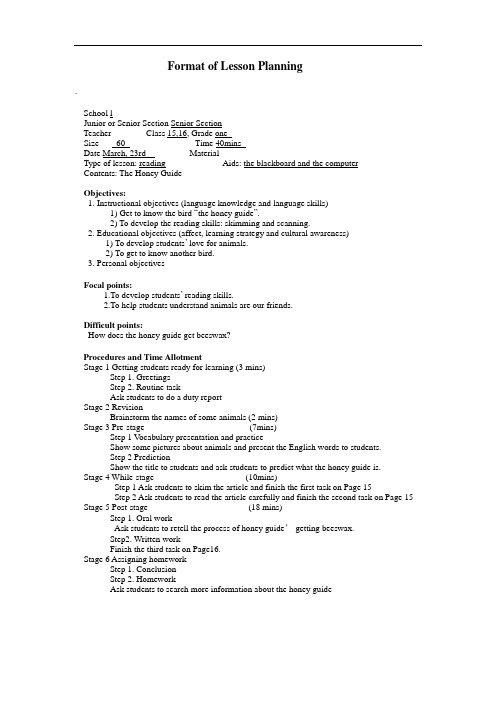
Format of Lesson Planning.School lJunior or Senior Section Senior SectionTeacher Class 15,16, Grade oneSize 60 Time 40minsDate March, 23rd MaterialType of lesson: reading Aids: the blackboard and the computerContents: The Honey GuideObjectives:1. Instructional objectives (language knowledge and language skills)1) Get to know the bird “the honey guide”.2) To develop the reading skills: skimming and scanning.2. Educational objectives (affect, learning strategy and cultural awareness)1) To develop students’ love for animals.2) To get to know another bird.3. Personal objectivesFocal points:1.To develop students’ reading skills.2.To help students understand animals are our friends.Difficult points:How does the honey guide get beeswax?Procedures and Time AllotmentStage 1 Getting students ready for learning (3 mins)Step 1. GreetingsStep 2. Routine taskAsk students to do a duty reportStage 2 RevisionBrainstorm the names of some animals (2 mins)Stage 3 Pre-stage (7mins)Step 1 Vocabulary presentation and practiceShow some pictures about animals and present the English words to students.Step 2 PredictionShow the title to students and ask students to predict what the honey guide is.Stage 4 While-stage (10mins)Step 1 Ask students to skim the article and finish the first task on Page 15Step 2 Ask students to read the article carefully and finish the second task on Page 15 Stage 5 Post-stage (18 mins)Step 1. Oral workAsk students to retell the process of honey guide’ getting beeswax.Step2. Written workFinish the third task on Page16.Stage 6 Assigning homeworkStep 1. ConclusionStep 2. HomeworkAsk students to search more information about the honey guide。
- 1、下载文档前请自行甄别文档内容的完整性,平台不提供额外的编辑、内容补充、找答案等附加服务。
- 2、"仅部分预览"的文档,不可在线预览部分如存在完整性等问题,可反馈申请退款(可完整预览的文档不适用该条件!)。
- 3、如文档侵犯您的权益,请联系客服反馈,我们会尽快为您处理(人工客服工作时间:9:00-18:30)。
Unit 2 What time is it? 第1 课时
课程总目标:
课程标准描述:对英语有好奇心,喜欢听他人说英语。
能做简单的角色表演。
能唱简单的英文歌曲,说简单的英语歌谣。
能在图片的帮助下听懂和读懂简单的小故事。
能交流简单的个人信息,表达简单的感觉和情感。
对英语学习中接触的外国文化习俗感兴趣。
本节课目中学生通过学习能够理解对话大意,正确朗读对话并进行角色扮演,能在情境中恰当运用句型表达和交流时间,以及在这个时间段所要做的事情。
并且了解地图上不同时区的不同时间。
【学情分析】
四年级学生,一个班约56人,在课标中属于是一级标准。
这个阶段学生对英语有一定的好奇心,喜欢听他人说英语,所以学生对英语学习有着很强的兴趣。
因此,培养学生形成良好听读习惯,了解简单的拼读规律,并能运用英语进行简单的信息交流,可以为今后高年级更深入的学习做好铺垫。
【学习目标】
【评价活动方案】
1. 通过热身活动中的游戏和歌曲,为达成语言技能的说唱目标。
2.通过“拨时针”游戏,引入对话情景的环节达成语言技能的听做目标。
3. 通过观看视频并跟读文本达成语言技能和语言知识的相关目标。
4. 通过Pairwork达成语言技能、语言知识、情感态度和学习策略的相关目标。
7. 通过Let’s play活动,让学生了解地球上不同时区在同一时刻的时间是不同的,达成文化意识目标。
课时教学步骤。
